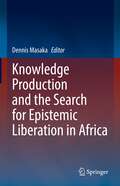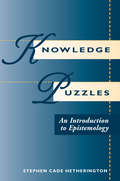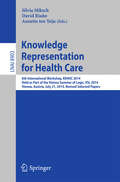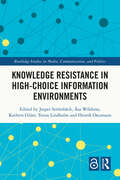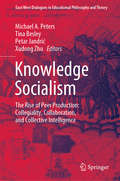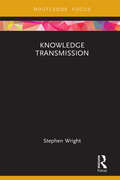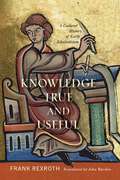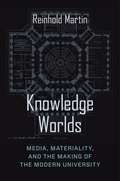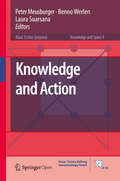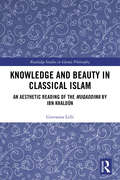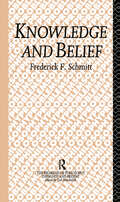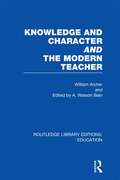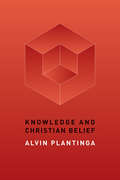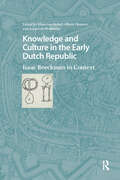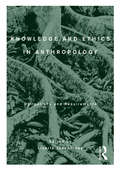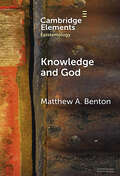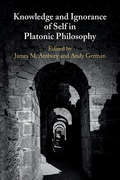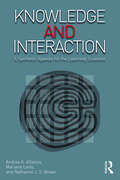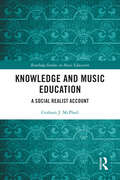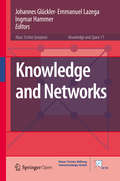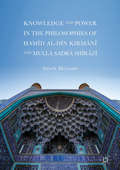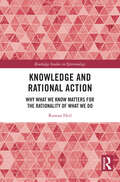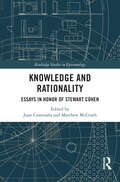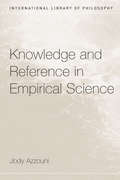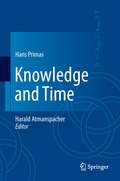- Table View
- List View
Knowledge Production and the Search for Epistemic Liberation in Africa
by Dennis MasakaThis book shows the importance of knowledge production using requisite terms and frameworks to the broader scheme of epistemic liberation in Africa. The text considers what this veritable direction to knowledge production would mean to other areas of concern in African philosophy such as morality, education and the environment. These contributions are important because the success of decolonising projects in African countries depend upon the methods that underpin envisioned liberative knowledge production in light of Africa’s historical and present condition. This volume appeals to students and researchers working in epistemology and African philosophy.
Knowledge Puzzles: An Introduction To Epistemology
by Stephen Cade HetheringtonDespite the problems students often have with the theory of knowledge, it remains, necessarily, at the core of the philosophical enterprise. As experienced teachers know, teaching epistemology requires a text that is not only clear and accessible, but also capable of successfully motivating the abstract problems that arise.In Knowledge Puzzles, Stephen Hetherington presents an informal survey of epistemology based on the use of puzzles to illuminate problems of knowledge. Each topic is introduced through a puzzle, and readers are invited to work their own ways toward a solution. Hetherington's light and undogmatic style encourages class discussion and independent thought rather than the memorization of book" answers.Covering all of the most important epistemological issues, informed by classical and contemporary literature, and rich in probing questions and suggestions for further readings, Knowledge Puzzles is a pedagogical breakthrough. Whether it is used as a main text or supplement, this lucid and engaging text will be welcomed by both teachers and students.
Knowledge Representation for Health Care
by David Riaño Silvia Miksch Annette Ten TeijeThis book constitutes the refereed proceedings of the 6th International Workshop on Knowledge Representation for Health Care, KR4HC 2014, held as part of the Vienna Summer of Logic, VSL 2014, in Vienna, Austria, in July 2014. The workshop aimed at attracting the interest of novel research and advances contributing in the definition, representation and exploitation of health care knowledge in medical informatics. The 12 revised full research papers and 4 short papers presented in this book were carefully reviewed and selected from 26 submissions.
Knowledge Resistance in High-Choice Information Environments (Routledge Studies in Media, Communication, and Politics)
by Jesper StrömbäckThis book offers a truly interdisciplinary exploration of our patterns of engagement with politics, news, and information in current high-choice information environments. Putting forth the notion that high-choice information environments may contribute to increasing misperceptions and knowledge resistance rather than greater public knowledge, the book offers insights into the processes that influence the supply of misinformation and factors influencing how and why people expose themselves to and process information that may support or contradict their beliefs and attitudes. A team of authors from across a range of disciplines address the phenomena of knowledge resistance and its causes and consequences at the macro- as well as the micro-level. The chapters take a philosophical look at the notion of knowledge resistance, before moving on to discuss issues such as misinformation and fake news, psychological mechanisms such as motivated reasoning in processes of selective exposure and attention, how people respond to evidence and fact-checking, the role of political partisanship, political polarization over factual beliefs, and how knowledge resistance might be counteracted. This book will have a broad appeal to scholars and students interested in knowledge resistance, primarily within philosophy, psychology, media and communication, and political science, as well as journalists and policymakers. The Open Access version of this book, available at www.taylorfrancis.com, has been made available under a Creative Commons Attribution-Non Commercial-No Derivatives 4.0 license.
Knowledge Socialism: The Rise of Peer Production: Collegiality, Collaboration, and Collective Intelligence (East-West Dialogues in Educational Philosophy and Theory)
by Michael A. Peters Xudong Zhu Petar Jandrić Tina BesleyThis is the first collection focusing on knowledge socialism, a particularly apt term used to describe a Chinese socialist mode of production and socialist approach to development and modernity based around the rise of peer production, new forms of collaboration and collective intelligence. Making the case for knowledge socialism, the book is intended for students, teacher, scholars and policy theorists in the field of knowledge economy.
Knowledge Transmission (Routledge Focus on Philosophy)
by Stephen WrightOur knowledge of the world comes from various sources. But it is sometimes said that testimony, unlike other sources, transmits knowledge from one person to another. In this book, Stephen Wright investigates what the transmission of knowledge involves and the role that it should play in our theorising about testimony as a source of knowledge. He argues that the transmission of knowledge should be understood in terms of the more fundamental concept of the transmission of epistemic grounds, and that the claim that testimony transmits knowledge is not only defensible in its own right, but indispensable to an adequate theory of testimony. This makes testimony unlike other epistemic sources.
Knowledge True and Useful: A Cultural History of Early Scholasticism (The Middle Ages Series)
by Frank RexrothA radical shift took place in medieval Europe that still shapes contemporary intellectual life: freeing themselves from the fixed beliefs of the past, scholars began to determine and pursue their own avenues of academic inquiry. In Knowledge True and Useful, Frank Rexroth shows how, beginning in the 1070s, a new kind of knowledge arose in Latin Europe that for the first time could be deemed “scientific.”In the twelfth century, when Peter Abelard proclaimed the primacy of reason in all areas of inquiry (and started an affair with his pupil Heloise), it was a scandal. But he was not the only one who wanted to devote his life to this new enterprise of “scholastic” knowledge. Rexroth explores how the first students and teachers of this movement came together in new groups and schools, examining their intellectual debates and disputes as well as the lifelong connections they forged with one another through the scholastic communities to which they belonged.Rexroth shows how the resulting transformations produced a new understanding of truth and the utility of learning, as well as a new perspective on the intellectual tradition and the division of knowledge into academic disciplines—marking a turning point in European intellectual culture that culminated in the birth of the university and, with it, traditions and forms of academic inquiry that continue to organize the pursuit of knowledge today.
Knowledge Worlds: Media, Materiality, and the Making of the Modern University
by Reinhold MartinWhat do the technical practices, procedures, and systems that have shaped institutions of higher learning in the United States, from the Ivy League and women’s colleges to historically black colleges and land-grant universities, teach us about the production and distribution of knowledge? Addressing media theory, architectural history, and the history of academia, Knowledge Worlds reconceives the university as a media complex comprising a network of infrastructures and operations through which knowledge is made, conveyed, and withheld.Reinhold Martin argues that the material infrastructures of the modern university—the architecture of academic buildings, the configuration of seminar tables, the organization of campus plans—reveal the ways in which knowledge is created and reproduced in different kinds of institutions. He reconstructs changes in aesthetic strategies, pedagogical techniques, and political economy to show how the boundaries that govern higher education have shifted over the past two centuries. From colleges chartered as rights-bearing corporations to research universities conceived as knowledge factories, educating some has always depended upon excluding others. Knowledge Worlds shows how the division of intellectual labor was redrawn as new students entered, expertise circulated, science repurposed old myths, and humanists cultivated new forms of social and intellectual capital. Combining histories of architecture, technology, knowledge, and institutions into a critical media history, Martin traces the uneven movement in the academy from liberal to neoliberal reason.
Knowledge and Action
by Peter Meusburger Laura Suarsana Benno WerlenThis volume explores interdependencies between knowledge, action, and space from different interdisciplinary perspectives. Some of the contributors discuss knowledge as a social construct based on collective action, while others look at knowledge as an individual capacity for action. The chapters contain theoretical frameworks as well as experimental outcomes. Readers will gain insight into key questions such as: How does knowledge function as a prerequisite for action? Why are knowledge gaps growing and not diminishing in a knowledge society? How much knowledge is necessary for action? How do various types of knowledge influence the steps from cognition to action? How do different representations of knowledge shape action? What impact have spatial conditions for the formation of knowledge? What is the relationship between social and geographical space? The contributors consider rationality in social and economic theories as well as in everyday life. Attention is also given to action theoretic approaches and rationality from the viewpoints of psychology, post-structuralism, and human geography, making this an attractive book for students, researchers and academics of various backgrounds. This book is open access under a CC BY 4. 0 license.
Knowledge and Beauty in Classical Islam: An Aesthetic Reading of the Muqaddima by Ibn Khaldūn (Routledge Studies in Islamic Philosophy)
by Giovanna LelliThis volume offers an aesthetic reading of the Muqaddima by Ibn Khaldūn (d. 1406), a text that has been studied up to the present as a work on historiography. It argues that the Muqaddima is also a comprehensive treatise on classical Arab-Islamic culture and provides a picture of classical Arab-Islamic aesthetics in its totality. The theme of the book is the intrinsic connection between beauty and knowledge in the Muqaddima. Whenever Ibn Khaldūn deals with the problem of knowledge and science, he also deals with the problem of sensual beauty as an instrument or an obstacle to attain it. Ibn Khaldūn’s philosophy of history is necessarily also an aesthetics of history. His key-notion of “group feeling”, the physical, ethic and aesthetic virtue of Bedouin societies, is at once the origin of the ascent of centralised States and the cause of their ruin. It represents a tragic contradiction that applies to the history of the Maghreb but then takes a universal value. It reflects a range of other contradictions inherent to the "system" of classical Arab-Islamic aesthetics. These contradictions undermine the aesthetic system of the Muqaddima from within and provide decisive elements for the emergence of modern aesthetics. Offering a comparative approach, the volume is a key resource to scholars and students interested in Arabic and Islamic studies, philosophy, aesthetics and global history.
Knowledge and Belief (Problems of Philosophy)
by Frederick F. SchmittKnowledge, from Plato onwards, has been considered in relation to justified belief. Current debate has centred around the nature of the justification and whether justified belief can be considered an internal or extenal matter. Epistemological internalists argue that the subject must be able to reflect upon a belief to complete the process of justification. The externalists, on the other hand, claim that it is only necessary to consider whether the belief is reliably formed, and argue that the ability to know by reflection is not required for a justified belief. In the historical section of this book the three most important epistemologists, Plato, Descartes and Hume, as well as the ancient epistemologies of the stoics, Academics and Pyrhonians, are considered. In reconsidering the history of epistemology the author is led to argue against hte view that internalism is historically dominant. His critique of internalism is then developed into a sustained argument against many of its forms, and he goes onto defend an externalist, reliabilist epistemology.
Knowledge and Character bound with The Modern Teacher (Routledge Library Editions: Education)
by William ArcherWritten before, but published after The First World War, this volume’s plea for a national system of education which will produce a nation of prosperous, morally fulfilled people able to live at peace with other nations is doubly poignant given the sacrifice of the ‘lost generation’. However, the author also sees the horror of the War as an opportunity to change human destiny through education, an opportunity to abandon the narrow system of education in favour of one which will ‘bring education in touch with life’ and provide Britain with the intellectual and moral efficiency necessary to steer her through the following turbulent years of the twentieth century. Covering the core subjects of the English school curriculum in the early twentieth century the chapters in The Modern Teacher, if somewhat utopian, describe best practice in teaching of the particular subject and suggest possible improvements. One chapter also discusses the importance of the relatively new subject of citizenship, as well as the moral education of pupils.
Knowledge and Christian Belief
by Alvin PlantingaIn his widely praised Warranted Christian Belief (Oxford, 2000) Alvin Plantinga discussed in great depth the question of the rationality, or sensibility, of Christian belief. In this book Plantinga presents the same ideas in a briefer, much more accessible fashion.Recognized worldwide as a leading Christian philosopher, Plantinga probes what exactly is meant by the claim that religious -- and specifically Christian -- belief is irrational and cannot sensibly be held. He argues that the criticisms of such well-known atheists as Richard Dawkins, Daniel Dennett, Sam Harris, and Christopher Hitchens are completely wrong. Finally, Plantinga addresses several potential “defeaters” to Christian belief -- pluralism, science, evil and suffering -- and shows how they fail to successfully defeat rational Christian belief.
Knowledge and Culture in the Early Dutch Republic: Isaac Beeckman in Context (Studies in the History of Knowledge)
by Klaas Van Berkel Albert Clement Arjan Van DixhoornThe Dutch Republic around 1600 was a laboratory of the Scientific Revolution of the seventeenth century. Here conditions were favourable for the development of new ways of knowing nature and the natural philosopher Isaac Beeckman, who was born in Middelburg in 1588, was a seminal figure in this context. He laid the groundwork for the strictly mechanical philosophy that is at the heart of the new science. Descartes and others could build on what they learned, directly or indirectly, from Beeckman. As previous studies have mainly dealt with the scientific content of Beeckman’s thinking, this volume also explores the wider social, scientific and cultural context of his work. Beeckman was both a craftsman and a scholar and fruitfully combined artisanal ways of knowing with international scholarly traditions. Beeckman’s extensive private notebook offers a unique perspective on the cultures of knowledge that emerged in this crucial period in intellectual history.
Knowledge and Ethics in Anthropology: Obligations and Requirements (Criminal Practice Ser. #31)
by Lisette JosephidesInspired by the work of world-renowned anthropologist Marilyn Strathern, this collection of essays features contributions from a range of internationally recognized scholars – including Strathern herself – which examine a range of methodologies and approaches to the anthropology of knowledge.The book investigates the production of knowledge through a variety of themes, centered on the question of the researcher’s obligations and the requirements of knowledge. These range from the obligation to connect with local culture and existing anthropological knowledge, to the need to draw conclusions and circulate what has been learned. Taking up themes that are relevant for anthropology as a whole – particularly the topic of knowledge and the ethics of knowing others, as well as the notion of the local in a global world – Knowledge and Ethics in Anthropology is key reading for students and scholars alike. A thorough introduction to the key concepts and terms used in Strathern’s work is provided, making this a fantastic resource for anyone encountering her work for the first time.
Knowledge and God (Elements in Epistemology)
by Matthew A. BentonThis Element examines a main theme in religious epistemology, namely, the possibility of knowledge of God. Most often philosophers consider the rationality or justification of propositional belief about God, particularly beliefs about the existence and nature of God; and they will assess the conditions under which, if there is a God, such propositional beliefs would be knowledge, particularly in light of counter-evidence or the availability of religious disagreement. This Element surveys such familiar areas, then turns toward newer and less-developed terrain: interpersonal epistemology, namely what it is to know another person. It then explores the prospects for understanding what it might take to know God relationally, the contours of which are significant for many theistic traditions.
Knowledge and Ignorance of Self in Platonic Philosophy
by Andy German James M. AmburyKnowledge and Ignorance of Self in Platonic Philosophy is the first volume of essays dedicated to the whole question of self-knowledge and its role in Platonic philosophy. It brings together established and rising scholars from every interpretative school of Plato studies, and a variety of texts from across Plato's corpus - including the classic discussions of self-knowledge in the Charmides and Alcibiades I, and dialogues such as the Republic, Theaetetus, and Theages, which are not often enough mined for insights about this crucial philosophical topic. The rich variety of readings and hermeneutical methods (as well as the comprehensive research bibliography included in the volume) allows for an encompassing view of the relevant scholarly debates. The volume is intended to serve as a standard resource for further research on Plato's treatment of self-knowledge, and will highlight the relevance of Plato's thought to contemporary debates on selfhood, self-reflection and subjectivity.
Knowledge and Interaction: A Synthetic Agenda for the Learning Sciences
by Andrea A. DiSessa Mariana Levin Nathaniel J.S. BrownDecades of research in the cognitive and learning sciences have led to a growing recognition of the incredibly multi-faceted nature of human knowing and learning. Up to now, this multifaceted nature has been visible mostly in distinct and often competing communities of researchers. From a purely scientific perspective, "siloed" science—where different traditions refuse to speak with one another, or merely ignore one another—is unacceptable. This ambitious volume attempts to kick-start a serious, new line of work that merges, or properly articulates, different traditions with their divergent historical, theoretical, and methodological commitments that, nonetheless, both focus on the highly detailed analysis of processes of knowing and learning as they unfold in interactional contexts in real time. Knowledge and Interaction puts two traditions in dialogue with one another: Knowledge Analysis (KA), which draws on intellectual roots in developmental psychology and cognitive modeling and focuses on the nature and form of individual knowledge systems, and Interaction Analysis (IA), which has been prominent in approaches that seek to understand and explain learning as a sequence of real-time moves by individuals as they interact with interlocutors, learning environments, and the world around them. The volume’s four-part organization opens up space for both substantive contributions on areas of conceptual and empirical work as well as opportunities for reflection, integration, and coordination.
Knowledge and Music Education: A Social Realist Account (Routledge Studies in Music Education)
by Graham J. McPhailKnowledge and Music Education: A Social Realist Account explores current challenges for music education in relation to wider philosophical and political debates, and seeks to find a way forward for the field by rethinking the nature and value of epistemic knowledge in the wake of postmodern critiques. Focusing on secondary school music, and considering changes in approaches to teaching over time, this book seeks to understand the forces at play that enhance or undermine music’s contribution to a socially just curriculum for all. The author argues that the unique nature of disciplinary-derived knowledge provides students with essential cognitive development, and must be integrated with the turn to more inclusive, student-centred, and culturally responsive teaching. Connecting theoretical issues with concrete curriculum design, the book considers how we can give music students the benefits of specialised subject knowledge without returning to a traditional past.
Knowledge and Networks
by Johannes Glückler Emmanuel Lazega Ingmar HammerThis book discusses a core question in many fields of the social sciences, namely how to create, share and adopt new knowledge. It creates an original space for conversation between two lines of research that have developed largely in parallel for a long time: social network theory and the geography of knowledge. This book considers that relational thinking has become increasingly important for scholars to capture societal outcomes by studying social relations and networks, whereas the role of place, space and spatial scales has been somewhat neglected outside an emergent geography of knowledge. The individual contributions help integrate network arguments of connectivity, geographical arguments of contiguity and contextuality into a more comprehensive understanding of the ways in which people and organizations are constrained by and make use of space and networks for learning and innovation. Experts in the fields of geography, sociology, economics, political science, psychology, management and organizational studies develop conceptual models and propose empirical research that illustrates the ways in which networks and geography play together in processes of innovation, learning, leadership, and power. This book is open access under a CC BY 4. 0 license.
Knowledge and Power in the Philosophies of Ḥamīd al-Dīn Kirmānī and Mullā Ṣadrā Shīrāzī
by Sayeh MeisamiThis book is a comparative study of two major Shīʿī thinkers Ḥamīd al-Dīn Kirmānī from the Fatimid Egypt and Mullā Ṣadrā from the Safavid Iran, demonstrating the mutual empowerment of discourses on knowledge formation and religio-political authority in certain Ismaʿili and Twelver contexts. The book investigates concepts, narratives, and arguments that have contributed to the generation and development of the discourse on the absolute authority of the imam and his representatives. To demonstrate this, key passages from primary texts in Arabic and Persian are translated and closely analyzed to highlight the synthesis of philosophical, Sufi, theological, and scriptural discourses. The book also discusses the discursive influence of Naṣīr al-Dīn Ṭūsī as a key to the transmission of Ismaʿili narratives of knowledge and authority to later Shīʿī philosophy and its continuation to modern and contemporary times particularly in the narrative of the guardianship of the jurist in the Islamic Republic of Iran.
Knowledge and Rational Action: Why What We Know Matters for the Rationality of What We Do (Routledge Studies in Epistemology)
by Roman HeilThis book motivates and systematically develops the view that knowledge should be at the centre of our theory of practical rationality.“Only act on what you know!”—the book offers the first comprehensive defence of this slogan in the form of a knowledge-based decision theory. The proposed view is shown to be the most straightforward explanation of emerging bodies of evidence for a link between knowledge and rational action. The book provides novel solutions to well-known challenges that invoke high-stakes scenarios, seemingly rational actions based on reasonable but false beliefs, and decision-making under risk and uncertainty. The emerging view brings together traditional and formal approaches to epistemology and the study of practical rationality. The resulting knowledge-based decision theory is embedded in a rich normative landscape, encompassing innovative accounts of excuses, rational acceptance and the simplification of reasoning.Knowledge and Rational Action will be of great interest to researchers and graduate students interested in epistemology, practical rationality and decision theory.
Knowledge and Rationality: Essays in Honor of Stewart Cohen (Routledge Studies in Epistemology)
by Juan Comesaña and Matthew McGrathThis book features original essays on knowledge and rationality as related to the work of Stewart Cohen. This is the first volume dedicated to Cohen, one of the most influential epistemologists of the last several decades.Stewart Cohen is responsible for introducing the New Evil Demon problem, the problem of easy knowledge, and epistemic contextualism. Any one of these contributions is sufficient by itself to establish a lasting philosophical legacy. The chapters in this book reflect Cohen’s legacy and address a variety of important topics related to his work, including the New Evil Demon problem, epistemic justification, epistemic contextualism, pragmatic and moral encroachment, epistemic obligations, skepticism, and the problem of easy knowledge. The book also includes a complete bibliography of Cohen’s works.Knowledge and Rationality is an essential resource for scholars and advanced students in epistemology with an interest in engaging with Stewart Cohen’s philosophy.
Knowledge and Reference in Empirical Science (International Library of Philosophy)
by Jody AzzouniKnowledge and Reference in Empirical Science is a fascinating study of the bounds between science and language: in what sense, and of what, does science provide knowledge? Is science an instrument only distantly related to what's real? Can the language of science be used to adequately describe the truth? In this book, Jody Azziouni investigates the technology of science - the actual forging and exploiting of causal links, between ourselves and what we endeavor to know and understand.
Knowledge and Time
by Harald Atmanspacher Hans PrimasThis is a unique volume by a unique scientist, which combines conceptual, formal, and engineering approaches in a way that is rarely seen. Its core is the relation between ways of learning and knowing on the one hand and different modes of time on the other. Partial Boolean logic and the associated notion of complementarity are used to express this relation, and mathematical tools of fundamental physics are used to formalize it. Along the way many central philosophical problems are touched and addressed, above all the mind-body problem. Completed only shortly before the death of the author, the text has been edited and annotated by the author's close collaborator Harald Atmanspacher.
